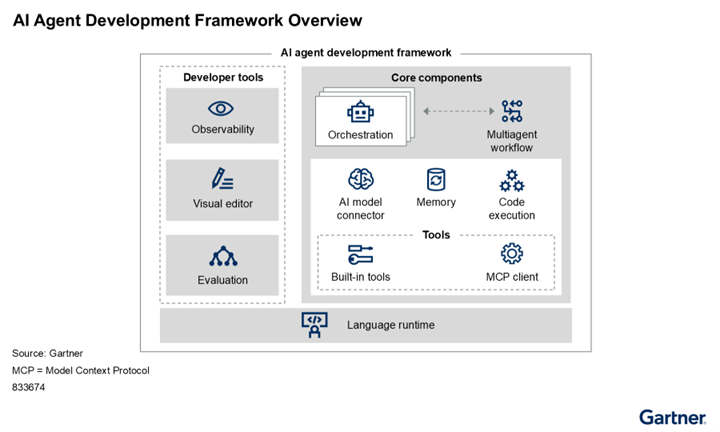Home > Blog > Artificial Intelligence
Subscribe to Our Blog
Get the latest trends, solutions, and insights into the event-driven future every week.
Thanks for subscribing.
As artificial intelligence continues to reshape software engineering, AI agent development frameworks are emerging as a cornerstone for building autonomous, intelligent systems.
The August 2025 Gartner® report, Innovation Insight: AI Agent Development Frameworks analyzes this evolving space, explaining the drivers behind rapid adoption, the benefits and use cases of these frameworks, and how organizations can choose the most suitable technologies for their needs. Below are our takeaways of this research, but we’d encourage you to read the report for yourself.
Gartner’s Perspective on AI Agent Development Frameworks
Building AI agents from scratch can be a daunting task. It involves orchestrating models, managing memory, integrating tools, and ensuring secure decision-making. The definition of AI agent development frameworks by Gartner aptly describes their purpose:
AI agent development frameworks are designed to accelerate the creation of AI agents and AI-powered applications capable of autonomously performing complex tasks by providing high-level abstractions for orchestration based on AI models, while also offering low-level control over agent logic (prompts, context, orchestration), memory, planning, and API access.
Key capabilities abstracted by these frameworks include planning and reasoning (breaking down goals into steps), memory management (maintaining context and accessing knowledge), tool use (interacting with external systems), managing the action/observation loop (the core cycle of agent operation), and coordinating multiple agents (mainly within a single codebase).” *
What is an AI Agent Development Framework?
As the image from Gartner below shows, we believe modern AI agent development frameworks should include the following core components:
- Orchestration engines to plan, manage and execute multi-agent workflows to achieve the required objective(s).
- Visual editors for designing multiagent systems
- Model Integration/LLM connectors for flexible model integration
- Built-in tools for retrieval-augmented generation (RAG), code execution, and external system/API access
- Observability and monitoring tools for transparency, debugging and performance tracking
- Evaluation (testing) platforms for testing agent behavior
Source: Gartner “Innovation Insight: AI Agent Development Frameworks”, 27 Aug 2025, Tigran Egiazarov, Arun Bathu, Gary Olliffe, Jim Scheibmeir, Arun Chandrasakaran, Adrian Leow
In Table 1 of the report, Gartner provides a list of sample frameworks from 8 mentioned vendors including Solace.
Benefits and Risks of AI Agent Development Frameworks
AI agent development frameworks can offer several advantages:
- Simplification and abstraction: Allowing developers to focus on core logic rather than infrastructure.
- Flexibility and control: Pro-code environments can allow for deep customization.
- Enhanced developer productivity: Standardized practices and tools can enhance developer productivity.
- Integration capabilities: Agents can autonomously interact with an organization’s internal APIs and systems of record, as well as with other agents, potentially built on other platforms.
Despite their promise, we believe these frameworks may also pose challenges:
- Security vulnerabilities: Prompt injection and data exposure risks require manual safeguards.
- Rapid evolution: Frequent updates can lead to technical debt and instability.
- Limited UI support: Most frameworks lack built-in UI components.
- Language limitations: Python dominates, requiring API-based integration for other languages.
- Nondeterministic behavior: AI agents can be unpredictable, complicating compliance and reliability.
Organizations must invest in AI-specific skills, including prompt engineering, Python proficiency, and API security.
Strategic Recommendations for Selecting and Implementing an AI Agent Development Framework
Gartner advises software engineering leaders to*:
- Start small: “Start by building and deploying single-agent solutions for well-defined, low-risk tasks. These initial implementations allow for manageable experimentation and learning. Avoid limiting yourself to frameworks that only support distributed multiagent systems — these systems are few, complex and rarely necessary for initial use cases.”
- Choose strategically: “Opt for frameworks that offer a robust ecosystem, comprehensive tool coverage and memory capabilities.”
- Treat advanced features as optional: “Advanced capabilities add significant complexity and security risks. Only adopt these if your use case clearly requires them and your team has the necessary expertise and controls.”
- Build a strong foundation: ”Invest in composable application architecture with an API-first approach and AI-ready data, ModelOps, and sound data governance. These elements are crucial for supporting adaptable agent behavior and integration into your application architecture.”
- Develop new skills: ”Address skill gaps in software engineering teams and enhance security knowledge by investing in AI-specific development practices, such as prompt engineering and understanding AI workflows. While those skills are evolving and need continuous uptraining, they should be scalable across teams. Be mindful of the complexity and potential cost implications associated with intricate, distributed multiagent systems.”
Market Outlook for Agentic AI and AI Agent Development Frameworks
Gartner predicts that “by 2028, 80% of organizations will report that AI agents consume the majority of their APIs, rather than developers.” * We feel this marks a fundamental shift in how software systems are built and operated.
AI agent development frameworks are not just tools, they’re enablers of a new paradigm in software engineering. As organizations race to embed intelligence into their applications, these frameworks will become essential for delivering scalable, secure, and autonomous solutions.
Download the Gartner Report: A Deeper Look at AI Agent Development Frameworks
Read the full report now to discover how AI agent development frameworks accelerate the creation of autonomous AI systems.
*Source: Gartner “Innovation Insight: AI Agent Development Frameworks”, 27 Aug 2025, Tigran Egiazarov, Arun Bathu, Gary Olliffe, Jim Scheibmeir, Arun Chandrasakaran, Adrian Leow.
GARTNER is a registered trademark and service mark of Gartner, Inc. and/or its affiliates in the U.S. and internationally and is used herein with permission. All rights reserved.
Gartner does not endorse any vendor, product or service depicted in its research publications, and does not advise technology users to select only those vendors with the highest ratings or other designation. Gartner research publications consist of the opinions of Gartner’s research organization and should not be construed as statements of fact. Gartner disclaims all warranties, expressed or implied, with respect to this research, including any warranties of merchantability or fitness for a particular purpose.
Explore other posts from category: Artificial Intelligence

As the leader of Solace’s analyst relations program, Roger has leveraged his technical background and analyst relations experience to develop a solid technical understanding of event-driven architecture, event streaming and event management that he uses to help analysts understand the many ways EDA and events can enable, complement, and accelerate the latest trends in computing and technology.
After kicking off his career as a programmer and professional services consultant, Roger shifted his focus to analyst relations with business intelligence innovator Cognos and IBM’s Business Analytics and Global Business Services consulting division when IBM acquired them, and for 20 years now he’s been working alongside Gartner, Forrester, IDC and other analysts to help them understand his employers’ position in the enterprise IT landscape.
Married for 30 years, Roger is the proud father of 3 adult children and enjoys DIY projects around the house and spending quiet time at the lake.


Subscribe to Our Blog
Get the latest trends, solutions, and insights into the event-driven future every week.
Thanks for subscribing.

